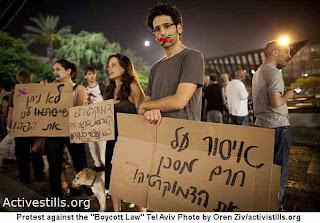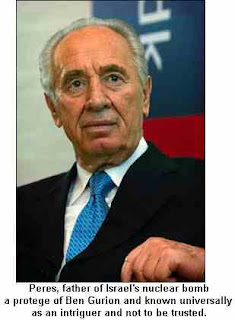The ‘only democracy in the Middle East’ recently took another step towards become a police state when it recently outlawed support for the Boycott in the country itself. This effectively criminalises free speech. If you advocate the boycott of Israeli goods, not just from Israel but the Occupied Territories themselves, then you are liable to be sued by those for who might be affected. You are not liable to prove damage for loss which raises the intriguing query as to how loss is to be assessed. It is a fundamental principle of all common law systems that if you sue then you sue on quantifiable loss.
But there has been a massive reaction, even inside Israel to this further attack on free speech. This is because, in the attack on Arabs and anti-zionists, the Israeli lawmakers are gradually infringing on the traditionally held belief that whatever you do to the Arabs Jews are in a different position altogether.
In the New York Times, Ahmad Tibi, an Arab member of the Israeli Knesset and Hadash (communist party front) openly defied the law and spoke out in favour of a boycott (only of the settlements) in an article in the NYT.
The New York Times, which used to be a byword for uncritical articles about Israel and a refusal to carry anything in the slightest favourable to the Palestinians seems to have begun changing. At one time, up to and just beyond the 2nd world war, under Jewish owner, Arthur Sulzberger, the NYT coverage was anti-Zionist or non-Zionist. A boycott of advertisers changed its mind.
Today it has begun questioning Israel’s status as a democracy as in its Editorial ‘Not Befitting a Democracy’. This isn’t of course an anti-Zionist tract but it raises questions that were never before heard in the NYT.
The third article, by Gideon Levy of Ha’aretz, speaks about the disgusting and shameful role played by Israel’s President Shimon Peres, a man who all his life has been known as an intriguer and untrustworthy. He compares him to his defeated rival, Reuven Rivlin/
Tony Greenstein
Editorial – Published: July 17, 2011
Not Befitting a Democracy
Israel’s reputation as a vibrant democracy has been seriously tarnished by a new law intended to stifle outspoken critics of its occupation of the West Bank.
The law, approved in a 47-to-38 vote by Parliament, effectively bans any public call for a boycott — economic, cultural or academic — against Israel or its West Bank settlements, making such action a punishable offense.
It would enable Israeli citizens to bring civil suits against people and organizations instigating such boycotts, and subject violators to monetary penalties. Companies and organizations supporting a boycott could be barred from bidding on government contracts. Nonprofit groups could lose tax benefits.
The law has rightly drawn fierce criticism in Israel. The newspaper Haaretz called it “politically opportunistic and antidemocratic,” and warned that it and other recently enacted laws were “transforming Israel’s legal code into a disturbingly dictatorial document.” In the United States, the Anti-Defamation League — which strongly supports Israel and opposes boycotts against it — warned that the law impinged on the “basic democratic rights of Israelis to freedom of speech and freedom of expression.”
We are also opposed to boycotts of Israel, but agree this is a fundamental issue of free speech.
Israel’s conservative government is determined to crush a growing push by Palestinians and their supporters for boycotts, disinvestment and sanctions against Israel. Since last year, many Israeli artists and intellectuals, as well international artists, have canceled performances and programs in Israel and the West Bank to protest the settlements. The bill’s sponsor, Zeev Elkin, said his concern was that the calls for a boycott “increasingly have come from within our own midst.”
With peace talks stalemated, Palestinians are searching for ways to keep alive their dream of a two-state solution, including a push for United Nations recognition this fall. Israel risks further isolating itself internationally with this attempt to stifle critics.
Prime Minister Benjamin Netanyahu should have exercised leadership and urged lawmakers against doing their country serious harm. While Mr. Netanyahu was absent for the vote, he eagerly insisted that it would never have passed “if I had not authorized it.”
Advocates said the law was needed to prevent efforts to “delegitimize” Israel, but no country can be delegitimized if it holds true to its democratic principles. Opponents are already challenging the law in court. We hope they succeed, for Israel’s sake.
A version of this editorial appeared in print on July 18, 2011, on page A18 of the New York edition with the headline: Not Befitting a Democracy: A worrying new law in Israel chips away at free speech and political rights.
By AHMAD TIBI
New York Times 29/7/2011
Free speech in Israel was dealt a severe blow this month when the country’s Parliament passed antiboycott legislation that targets individuals or organizations publicly calling for a boycott against Israel or any area under its control.
Because I believe in ending the Israeli occupation of Palestinian territory, equal rights for Palestinians and Jews, and the right of return for Palestinian refugees forced from their homes and lands in 1948, I support boycotting — and calling on others to boycott — all Israeli companies that help perpetuate these injustices.
But this new legal limit on free speech could bankrupt me.
Israeli officials will not throw me in jail for publicly supporting such boycotts, but settler groups can claim financial damages without even having to show any harm done. Furthermore, organizations supporting boycotts could be denied tax-deductible contributions and state funding. This week, I appealed the law to the high court.
Already, a member of the Knesset, our Parliament, Alex Miller, has threatened to sue me for my words — specifically my call, which I continue to make today, to boycott the illegal Jewish settlement of Ariel. Such a call would be unremarkable in a proper democracy with untrammeled free speech. The right to criticize a population that has dispossessed Palestinians and discriminated against us for decades should be protected speech.
Perhaps my parliamentary immunity will protect me, but that can readily be stripped. Moreover, parliamentary immunity will not protect Israelis who urge fellow citizens not to buy Ahava beauty products created from natural resources illegally extracted from the occupied shores of the Dead Sea and manufactured in a factory in an illegal West Bank settlement, to avoid wines from the occupied Golan Heights, or to hire construction companies other than those that build exclusive and discriminatory housing units for settlers in occupied East Jerusalem.
Prime Minister Benjamin Netanyahu has proudly taken ownership of the bill for his Likud party, declaring: “Don’t be confused — I authorized the bill. If I hadn’t authorized it, it wouldn’t have gotten here.” Given Netanyahu’s warm reception on Capitol Hill when he visited the United States a few weeks ago, I fear that most members of Congress will not offer a peep of protest,
even as Israel, a key American ally that bills itself as “the only democracy in the Middle East,” strays into undemocratic and clearly bigoted lawmaking.
The Israeli Parliament’s antiboycott legislation is an unprecedented effort to undercut nonviolent resistance to Israeli oppression. Many people believe that making nonviolence more difficult will make violence inevitable. I do not. Approving such irresponsible and reactionary legislation highlights Israel’s long decades of injustice to Palestinians and hands us something of
a political victory. Through this legislation, Israel has drawn further attention to its violent occupation of Palestinian territory and routine violations of international law.
Colonizing settlers and their elected representatives now rule Israel’s political landscape, and few dare to stand against them. This reticence in the face of repeated abuses by settlers reflects poorly on Israeli society and the U.S. government.
One of Israel’s leading newspapers, Haaretz, noted in an editorial that the antiboycott legislation “is a politically opportunistic and antidemocratic act, the latest in a series of outrageously discriminatory and exclusionary laws enacted over the past year, and it accelerates the process of transforming Israel’s legal code into a disturbingly dictatorial document. It casts the threatening shadow of criminal offense over every boycott, petition or even newspaper op-ed. Very soon, all political debate will be silenced.”
Haaretz may well be right. I prefer to believe, however, that the overreach of the extreme right in Israel will eventually rouse people of good will in the United States and Europe to put greater pressure on the Israeli government to change course. Despite the hopes of American politicians,
Israel is not going to change on its own. Only very real international pressure will force the Israeli government to change. Until then, we can expect more discriminatory and undemocratic legislation from this Knesset.
Ahmad Tibi, an Arab Israeli, is deputy speaker of the Israeli Parliament.
By Gideon Levy
In the summer of 2000, half the country (including this writer) wept over Shimon Peres’ loss to Moshe Katsav in the presidential election. In the summer of 2007, Reuven Rivlin wept over his loss to Peres. In the summer of 2011, it seems that Rivlin, now Knesset speaker, has taken on the role that should have been Peres’.
On Friday, Rivlin published a courageous article in Haaretz against the Boycott Law, while President Peres mumbled something about “waiting for the High Court to decide.” Rivlin has been revealed as Israel’s honorary president; Peres, as its shameful one. The man from the right wing dared do what the man supposedly from the left did not. In the test of courage and honesty, the highest test of any elected official, Rivlin defeated Peres by a resounding knock-out.
Peres and Rivlin both hold high office. Both must be “statesmanlike” and “unifying”; both can hide behind that attitude and take no controversial stand. Peres has held fast to it and says nothing; Rivlin, straightforward and brave, is prepared to speak his peace at almost any price. Peres is more beloved and admired than Rivlin, but the highest praise should go to the speaker of the Knesset.
Rivlin will pay the price for his sharply worded article. The Likud man who writes about the shameful law his party initiated, “woe betide the Jewish democratic state that turns freedom of expression into a civil offense,” and, “I stand ashamed and mortified before my mentor, Jabotinsky,” will pay the price at the polls in the primary. That did not deter him. Peres, who has far less to lose – neither a primary nor the Likud Central Committee – preferred to curl up in his silence, or, as some would say, his cowardice.
It is not difficult to guess what Peres thinks about this anti-democratic means of silencing people. One does not have to be a Peres-ologist to know what he will yet say behind tightly closed doors about this insane piece of legislation. But his heart is, as usual, just as tightly closed. Such remarks therefore have no significance at all. Peres is judged only by what he says publicly, and his public remarks are empty, despite all the “presidential conferences.”
A president must indeed be above the people. He must not intervene in every single controversy. But the debate over the Boycott Law is not just any controversy. It has to do with the future of government and society in Israel. A president who has nothing to say about that is not a president. A president who is silent under such circumstances is collaborating with the bullies of the right-wing. If there is one law about which a president must, absolutely must, speak up, it is this one. If there is one matter over which he must not remain silent, it is this one.
If Peres still has a role left it is to try to stop the destruction of democracy. This is not even a fight for peace and against the occupation, about which Peres also whispers behind closed doors. This is the core of cores. But Peres is waiting for the High Court to decide. Perhaps there, the courage will be found that he lacks.
Rivlin is ashamed before his mentor, Jabotinsky; Peres should be much more ashamed before his mentor, Ben-Gurion. And definitely, publicly so.
In the winter of his life, Peres has become a walking legend. We may be happy for him. I saw him on Thursday at a reception in honor of Bastille Day at the home of the French ambassador to Israel, Christof Bigo; Peres was gracious as usual, eliciting waves of empathy and laughter, amazingly vital, flirting charmingly with his translator.
But that is not enough; certainly not in these dark days. It is precisely this later Peres, the beloved and the admired, who has endured so much shame and and humiliation in the past, precisely this Peres, who can finally emerge from his cowardice and speak his peace about what the right wing is doing to this country, which he helped establish. But no, Peres remains Peres: lofty in the office of president, he leaves this fateful work to Rivlin and the High Court, so as not, perish the thought, to anger MK Zeev Elkin, initiator of the Boycott Law. How did Rivlin put it? Woe betide us.


